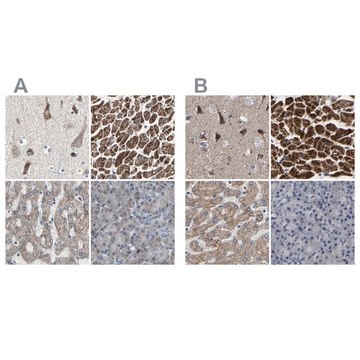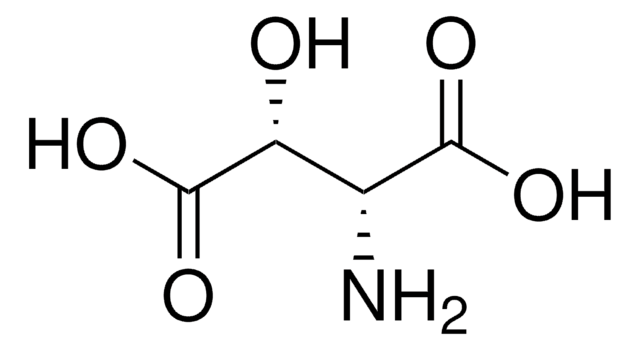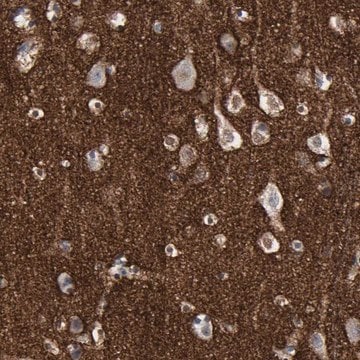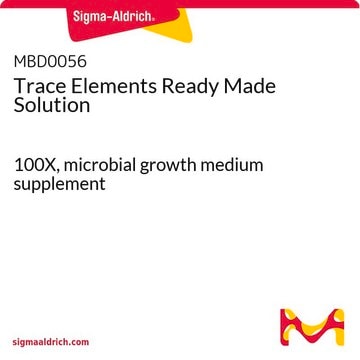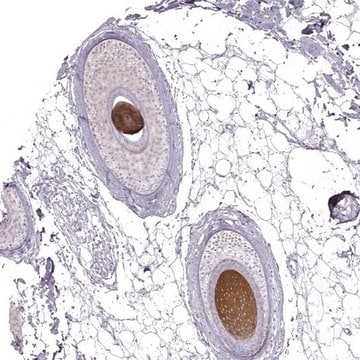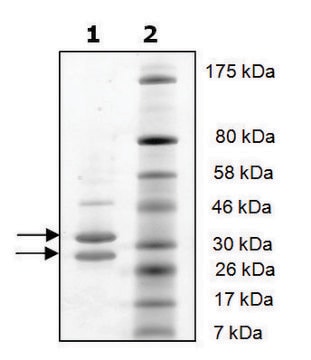AB10346
Anti-SOD2 Antibody
serum, Chemicon®
Synonym(s):
Superoxide Dismutase 2 (SOD2)
Sign Into View Organizational & Contract Pricing
All Photos(1)
About This Item
UNSPSC Code:
12352203
eCl@ss:
32160702
NACRES:
NA.41
Recommended Products
biological source
rabbit
antibody form
serum
antibody product type
primary antibodies
clone
polyclonal
species reactivity
mouse, human, rat
manufacturer/tradename
Chemicon®
technique(s)
western blot: suitable
NCBI accession no.
UniProt accession no.
shipped in
wet ice
target post-translational modification
unmodified
Gene Information
mouse ... Sod2(20656)
General description
This gene is a member of the iron/manganese superoxide dismutase family. It encodes a mitochondrial protein that forms a homotetramer and binds one manganese ion per subunit. This protein binds to the superoxide byproducts of oxidative phosphorylation and converts them to hydrogen peroxide and diatomic oxygen. Mutations in this gene have been associated with idiopathic cardiomyopathy (IDC), premature aging, sporadic motor neuron disease, and cancer. Alternate transcriptional splice variants, encoding different isoforms, have been characterized.
Immunogen
Epitope: AA G93 – Y217
Recombinant human SOD2
Application
This Anti-SOD2 Antibody is validated for use in WB for the detection of SOD2.
Quality
Routinely evaluated by immunoblot.
Target description
28 kDa
Legal Information
CHEMICON is a registered trademark of Merck KGaA, Darmstadt, Germany
Not finding the right product?
Try our Product Selector Tool.
recommended
Product No.
Description
Pricing
Storage Class Code
10 - Combustible liquids
WGK
WGK 1
Certificates of Analysis (COA)
Search for Certificates of Analysis (COA) by entering the products Lot/Batch Number. Lot and Batch Numbers can be found on a product’s label following the words ‘Lot’ or ‘Batch’.
Already Own This Product?
Find documentation for the products that you have recently purchased in the Document Library.
Loss of LRPPRC causes ATP synthase deficiency.
Mourier, A; Ruzzenente, B; Brandt, T; Kuhlbrandt, W; Larsson, NG
Human Molecular Genetics null
Yukio Shimasaki et al.
Circulation research, 113(7), 891-901 (2013-07-04)
Mitochondria, although required for cellular ATP production, are also known to have other important functions that may include modulating cellular responses to environmental stimuli. However, the mechanisms whereby mitochondria impact cellular phenotype are not yet clear. To determine how mitochondria
Anthony R Cyr et al.
Redox biology, 1, 172-177 (2013-09-12)
Manganese superoxide dismutase, encoded by the Sod2 gene, is a ubiquitously expressed mitochondrial antioxidant enzyme that is essential for mammalian life. Mice born with constitutive genetic knockout of Sod2 do not survive the neonatal stage, which renders the longitudinal study
Xiaoyuan Lin et al.
Aging and disease, 13(5), 1471-1487 (2022-10-04)
Excessive sodium fluoride (NaF) intake interferes with reproductive function in humans and animals; however, strategies to prevent these effects are still underexplored. Here, we showed that in vivo and in vitro supplementation of folic acid (FA) efficaciously improved the quality
Thomas Rostgaard Andersen et al.
PloS one, 11(2), e0148236-e0148236 (2016-02-18)
The effects of 52 weeks of soccer or resistance training were investigated in untrained elderly men. The subjects aged 68.1±2.1 yrs were randomised into a soccer (SG; n = 9), a resistance (RG; n = 9) and a control group
Our team of scientists has experience in all areas of research including Life Science, Material Science, Chemical Synthesis, Chromatography, Analytical and many others.
Contact Technical Service
